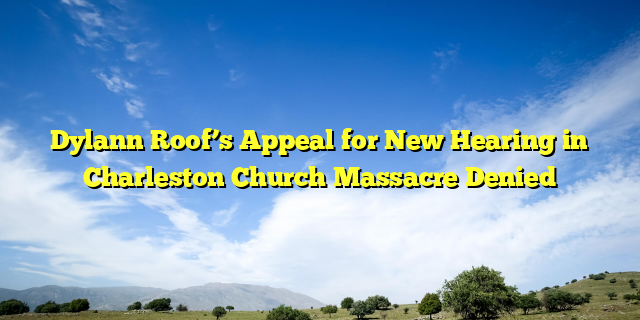📚 Unlock the World of AI and Humanity with These Two Free Books! 🚀
Dive into the thrilling realms of artificial intelligence and humanity with "The ECHO Conundrum" and "Awakening: Machines Dream of Being Human". These thought-provoking novels are FREE this week! Don't miss the chance to explore stories that challenge the boundaries of technology and what it means to be human.
Read More & Download
The 4th U.S. Circuit Court of Appeals has denied Dylann Roof’s request for a new hearing to challenge his death sentence and conviction in the 2015 racially motivated Charleston church massacre. Roof, who murdered nine Black parishioners at Mother Emanuel AME Church, had sought a full appellate court review and the designation of substitute judges from other circuits due to the recusal of all 4th Circuit judges.
Dylann Roof enters the courtroom at the Charleston County Judicial Center in 2017. His conviction and death sentence for the Charleston church massacre have been upheld by a federal appeals court.
The Recusal Complication and Roof’s Arguments
The unusual circumstance of all 4th Circuit judges recusing themselves stems from Judge Jay Richardson’s involvement as the lead prosecutor in Roof’s 2017 trial. This recusal created a unique challenge in the appeals process, leading to the appointment of judges from other circuits to hear the initial appeal.
Roof’s legal team argued that he was wrongly allowed to represent himself during the sentencing phase, preventing the jury from hearing crucial evidence about his mental health. They claimed Roof, under a delusion of being rescued by white nationalists, deliberately withheld this information believing it would jeopardize his imagined rescue.
The Court’s Decision and Roof’s Remaining Options
In May 2021, a panel of judges from other appellate circuits heard Roof’s appeal. Three months later, they unanimously upheld his conviction and death sentence, condemning the horrific nature of his crimes. The judges stated that “no cold record or careful parsing of statutes and precedents can capture the full horror of what Roof did.”
Following this decision, Roof sought a rehearing before a full appellate court, arguing the panel had misinterpreted the Commerce Clause of the U.S. Constitution. The government opposed this, asserting the prosecution had sufficiently proven its case.
Dylann Roof’s 2015 mugshot following his arrest for the Charleston church shooting.
The 4th Circuit’s Monday order rejected Roof’s requests. Citing Supreme Court precedent, the court refused to appoint a full substitute court, emphasizing that only active judges of the circuit can determine whether to grant a rehearing.
📚 Unlock the World of AI and Humanity with These Two Free Books! 🚀
Dive into the thrilling realms of artificial intelligence and humanity with "The ECHO Conundrum" and "Awakening: Machines Dream of Being Human". These thought-provoking novels are FREE this week! Don't miss the chance to explore stories that challenge the boundaries of technology and what it means to be human.
Read More & Download
Despite this setback, Roof still has several legal avenues available. He can file a 2255 appeal, requesting the trial court review the constitutionality of his conviction and sentence. He can also petition the U.S. Supreme Court for review or seek a presidential pardon.
The Charleston Church Massacre: A Tragedy and its Aftermath
The 2015 shooting at Mother Emanuel AME Church shocked the nation, highlighting the devastating consequences of racial hatred and domestic terrorism. Roof’s attack during a Bible study, where he fired dozens of bullets at the assembled parishioners, remains a stark reminder of the ongoing struggle against racism and violence.
The victims, known for their faith and community leadership, included the church’s pastor, Rev. Clementa Pinckney, who also served as a state senator. Their deaths left a deep wound in the Charleston community and sparked national conversations about race, gun violence, and the legacy of slavery.
Mother Emanuel AME Church in Charleston, South Carolina, the site of the 2015 massacre.
The Importance of Justice and Accountability
The legal proceedings against Dylann Roof have been closely followed, with many seeking justice for the victims and their families. The appeals process, while complex and lengthy, plays a vital role in ensuring fairness and upholding the rule of law.
The denial of Roof’s latest appeal represents another step in the pursuit of justice. While the legal battles may continue, the court’s decision reinforces the severity of his crimes and the commitment to hold him accountable for his actions.
Conclusion: Seeking Closure and Moving Forward
The Charleston church massacre remains a painful chapter in American history. The denial of Roof’s appeal brings a sense of closure for the victims’ families and the community, although the scars of this tragedy will likely endure. The ongoing legal process underscores the importance of accountability and the pursuit of justice, even in the face of unimaginable acts of violence. While the legal system can never fully restore what was lost, it serves as a mechanism for seeking redress and reaffirming the values of equality and justice.
📚 Unlock the World of AI and Humanity with These Two Free Books! 🚀
Dive into the thrilling realms of artificial intelligence and humanity with "The ECHO Conundrum" and "Awakening: Machines Dream of Being Human". These thought-provoking novels are FREE this week! Don't miss the chance to explore stories that challenge the boundaries of technology and what it means to be human.
Read More & Download

